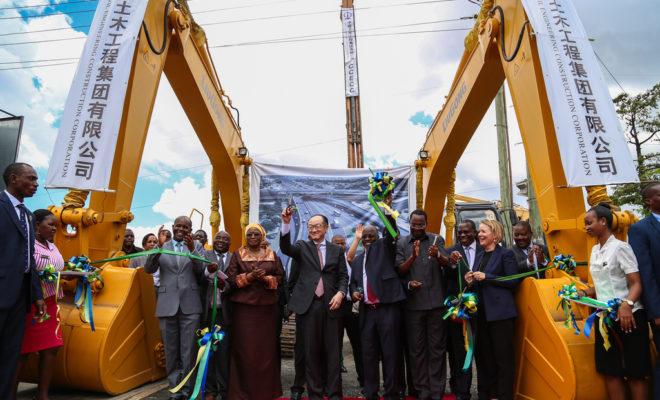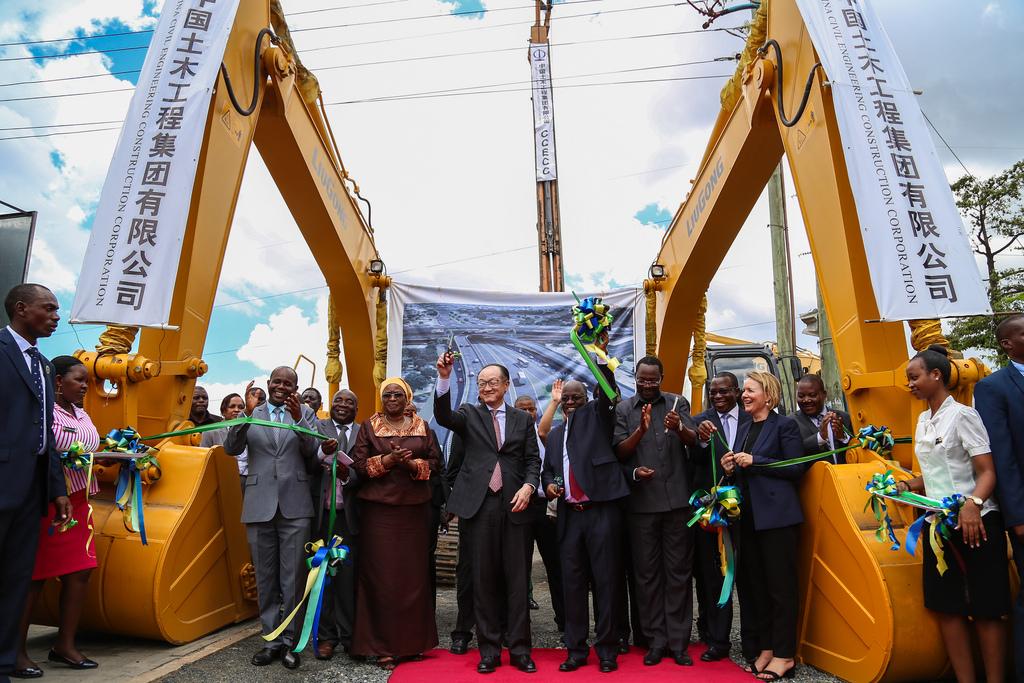Tanzania: Magufuli’s mining reforms are a masterclass in political manoeuvring

Whether his moves in the mining sector work or not, President Magufuli knows what he is doing.

President John Magufuli with World Bank president Jim Kim. Credit: Sarah Farhat/World Bank.
Ever since his election in 2015, Tanzania’s President John Magufuli has been a subject of public fascination. At first, his war on graft promised to cleanse the state of corruption, while his patriotic thrift inspired the hashtag #WhatWouldMagufuliDo?
[#WhatWouldMagufuliDo sparks new bout of Tanzaphilia]
But as this campaign of tumbua majipu (“lance the boils”) was becoming old news, Magufuli became associated with another d-word. To “development” was added “dictatorship”. Public rallies were banned, radio stations shut down, and newspapers publicly threatened. It became apparent that Tanzania was taking a sharp authoritarian turn.
[Can confrontation and violence be avoided on Tanzania’s “Day of Defiance”?]
Now, Magufuli’s image is shape-shifting once again. Over a matter of days earlier this month, the president turned Tanzania’s mining policy on its head. A regime of low taxes, free enterprise and light-touch regulation ended at the stroke of a pen. Magufuli assumed a new identity: the president that took on the multinationals.
Confronting the miners
The changes began in earnest on 3 March, when Magufuli imposed a ban on exporting unprocessed mineral ores. Containers holding copper-gold concentrates began to gather in the port of Dar es Salaam. On 29 March, Magufuli appointed a committee to chemically examine the contents of the containers, which belonged to Acacia Mining, a subsidiary of Barrick Gold.
That committee claimed that the containers held more than 14 times the quantity of gold Acacia had reported. They concluded that the company had been trying to swindle the government, and had probably been doing so for years. A series of estimates were circulated about how much Tanzania might have lost over the years.
Acacia Mining flatly denies the allegations and insists the Tanzanian government routinely samples containers at the mine site. Others suggest that customs checks are lax and trust the Office of the President more than a foreign company. Either way, the government’s alleged proof of Acacia’s underreporting has been used as a pretext for action.
Earlier this month, the National Assembly passed three bills which effectively overhaul Tanzania’s mining policy regime. The royalty rate on gold is raised from 4% to 6%. The government is entitled to a 16% share of mining companies stock without compensation, and empowered to purchase a further 34%. The regulation banning the exportation of concentrates and unprocessed minerals now has the permanence of an act of law , and 1% clearing fee is to be levied on mineral exports.
A break with the past
Magufuli’s austerity and intolerance for corruption were popularly interpreted as a departure from the clientelism and expanding government spending popularly associated with Jakaya Kikwete, his immediate predecessor. But if the first act of Magufuli’s presidency represented a break from Kikwete, the next signifies a break with former presidents Ali Hassan Mwinyi and Benjamin Mkapa.
It was Mwinyi who presided over the liberalisation of the economy and privatisations of the early 1990s. And it was Mkapa and the World Bank that drew up the 1998 Mining Act, which established the policy framework that governed Tanzania until two weeks ago.
That law not only introduced a gold royalty rate of 3% and a smooth license application process. It also created the most controversial aspect of Tanzania’s mining policy: development agreements. These contracts, negotiated between mining companies and the government, were almost never made public. They typically included reduced royalty rates, tax exemptions, and legal assurances that mines would be safe from government interference and seizure.
Magafuli’s new legislation explicitly write development agreements out of Tanzanian law. This move not only tears up contracts with mining companies, but also tears up the consensus on mining policy within the ruling party. Speaking at a public rally two week ago, Magufuli complained: “We privatised even strategic institutions like the railways corporation. It’s like we decided to leave each and everything to investors, which was wrong.”
The passage of these recent acts will not close the issue. Tanzania wants foreign investment just as mining companies want the favour of government. Magufuli compromises when he needs to. He settled a dispute with Dangote in 2016, and it is likely that he will amend recent changes to mining if he needs to. But until recently, mining companies seemed determined to slow down reforms at every turn. The president’s legislative spree makes clear that the government is not to be trifled with. His actions are as much pre-negotiation tactics as they are about unilaterally creating a new mining regime.
Party politics
Below the surface, Magufuli’s changes are also about party politics. The president’s approval ratings stood at 71% this June, down from 96% a year ago, though part of the difference may be down to survey question wording and methodology. These ratings might still seem sky high, but a combination of social desirability bias and civic duty make Tanzanians almost always answer in the affirmative to questions about presidential approval. By Tanzanian standards, 71% is poor. In fact, it is the worst rate any Tanzanian president has ever received.
[Tanzania’s President Magufuli: man of the people, man of the party?]
The public trusts the ruling CCM over the opposition on almost every area of government. But for a decade, natural resource governance has been a rare issue on which the opposition is strong and on the right side of opinion. In 2007, opposition party Chadema launched a public opinion and party-building exercise called Operation Sangara. Sangara (meaning “Nile perch”) was used as symbol both for CCM’s “big fish” preying on ordinary Tanzanians, and for the nation’s natural wealth that CCM was colluding with foreign business to plunder. Chadema took this message to the regions that encircle Lake Victoria, which are also home to Tanzanian’s largest gold mines. In the 2010 elections, they made gains across the Lake Zone.
Typically, the more that CCM has tried to play catch-up on mining policy, the happier the opposition has been. For example, when Kikwete established the Bomani Commission to recommend changes to mining policy and extracted concessions from the mining companies, the opposition jeered. They denounced the compromises, cheap talk and close relationships between CCM and business. They are still pressing the issue particularly hard against Kikwete, who presided over several of the first licenses for Tanzania’s largest mines while Minister for Water and Energy from 1990 to 1994.
Magufuli’s foray into mining policy differs from those of his predecessors. While Mkapa and Kikwete favoured incentives and negotiation, Magufuli favours action and theatrics. It was no accident that Magufuli declared that “the world is currently fighting an economic war”. He is putting clear water between himself and the mining companies, and stealing the opposition’s clothes in the process. If anyone still doubted that parties compete over issue ownership in Tanzania, they should think again.
By picking a fight with multinational companies, Magufuli is intentionally stirring popular memories of Tanzania’s first president, Julius Nyerere. In Tanzania, political morality is understood in terms of finding one’s way back to Nyerere. By espousing the language of sovereignty and economic war, Magufuli is tapping into political memories of liberation struggle and revolution. While Magufuli is marking a break from his predecessors, he is still invoking a romanticised idea of the past.
The events of two weeks ago amount to a radical overhaul of Tanzanian mining policy, but also a masterclass in political manoeuvring. This is not to cast aspersions about the sincerity of Magufuli’s intentions to reform the mining sector, but to illustrate that those reforms serves several purposes at once.
Magufuli’s critics often accuse him of impulsiveness. In May this year, The Economist wrote that “he has a worrying tendency not to think things through”. But whatever one thinks of the merits of pressing the mining companies hard, all signs suggest that Magufuli is in fact thinking hard, and not only about the economic but the political too.







Magufuli is the best. i am Tanzanian and very proud of him. The reform is for the interest of the vast majority. Him and the government are doing the right thing .
I thinks time has come to take things positive from what Tanzania President JP Maguli is doing. Let stop having Western minds on how Tanzania should looked.
We people lived in UK or other EU country, we know how much Western countries defends their economy. So let support the JM Magufuli to build his country and stop the poisoning his process.
What President Magufuri is doing in relation to the Mining policy, and indeed the Extractive Industry in general, is on the right track. In fact he has been generous to offer an opportunity for “re-negotiations” based on the new recently introduced legislations. Why the Mining companies denies to go back on the table for renegotiation of contentious issues which are not many but very relevant for a win-win situation between the Tanzanian Government and the investors.
We are talking about the Fiscal Regime in the extractive industry in Tanzania. Surely, it need to be re-looked afresh as there are other very technical issues such as “Base Errossion and Profit shifting” which are cropping-up in the process of implementation. The second issue is related to the controversial clause known as “stability clause” in both contracts- MDAs and PSAs -which basically is one sided. That also need to be re-worked afresh for the benefits of both parties. The third issue is related to the “ownership” and participation in the running of day to day activities of the mines. Surely, the former system was flawed as the Government lacked information on what was going on in the mines but at the end of the day, being told that the Mines were loss making operations. Again, this matter needed to reworked afresh for the interest of both parties. There is also an issue of an involvement of the Central Bank in relation to “Gold Reserves” and money transfers affairs of the Mining companies.
The last but not least, the issue of involvement of the “third parties” in the contracts needed to be clarified notwithstanding that it is somehow covered under the Income Tax Act trough “thin capitalization” clauses in relation to the Income Taxation.
These are the key issues which President Magufuri want to be renegotiated for the already signed MDAs and PSAs. For future contracts, the new legislations will have to be followed. So what is the problem to the extent of making such unnecessary movies?
What is the meaning of the picture to the content of the article?
President Magufuli, is a great thinker.
He is for all Tanzanians well being.
Wish him all the best.
I commend Magufuli work, his zero tolerance on our corrupt brothers who plunged the country into abyss. His emphasis on tax payment, and austerity measures he puts-ensure we are spending on issues that affects us all. We are equally affected by the changes, as we were used to laser fare kind of life, however, we do not feel the pinch as we are witnessing genuine move to economic reliance. As long as he is touching western world interest, we are not going to rest.
I happen to have lived all the presidencies to date, but none has quenched Tanzanians desire like Magufuli… None has been bold enough to tell Tanzanian straight without mincing any word. We were not used…some felt insulted, but majority are starting embracing the move. So the writing that 70% is smallest of any past president, or political manoeuvre…please give us a break.
We Africans never have time to discuss your own oppressive policies. But you have time on our own. Go ahead write what you want, we will go ahead and do what we think is right. We are tired of your negativity and thefty.
comrades President Magufuli appear to be doing what should be done throughout Africa with inclusion of coordination of sales plus intent to maximize benefit of possessing resources possessed while upgrading access to modern living conditions for all Buntu Africans. It is inevitable that” non puppet” leaders of Africa will coordinate their sale of resources plus obligate processing of those resources before those resources leave Africa. Anything less is exercise in stupidity a development minded Africa should not embrace. Very much sincere, Henry Price Jr. aka Obediah Buntu IL-Khan aka Kankan.
Yes his main goal is gaining political suprimacy. However the decision can be a turning point for the mineral sector to be one of the most economic contiributor to the country economy. The president has taken turning point from his CCM party stand minerals and took some of the opposition long time proposals on the sector.
This drastic changes could as well lead to the plunge of the sector where investors could hold back given unpredictability of the president. He is mostly swayed by political opinions rather than reality and prudency.
The presidential commitee reports to me are mostly exagarated and out of facts.
Magufuli brings mixed feelings to most of us. Some of the decisions he makes are purely out of the betterment of the country. He has done things that the previous three presidents couldn’t do. However, despite the good things he’s doing, he’s not shy at all at damaging the democracy.
Whether people like it or not, Tanzania’s democracy is in bad shape at the moment. He uses forces to oppress and take rights of political parties. He can’t stand criticism and that is very worrying. He breaks the constitution almost every time he addresses the nation.
Personally, I am in dilemma. I can’t hate or like him a hundred percent. He does good things for the people but he also does shocking things that annoy people. Its hard to imagine his next move or what he thinks.
Its a shame he cannot stand in one line. Because if he could have done, he’s one of the best leaders in the world.
Good article and while I agree that Tanzania has been corrupted in the past and has not necessarily benefited from the resources the current method of righting the wrongs of the past is leaving Tanzania very exposed to a future lack of investment. No matter the rights and wrongs of the past the aim now must be to learn and prevent this from happening again. Scaring future investors will not create the conditions for jobs and skills. And patriotic nationalism is all very well but does not feed or educate children and leads a country backwards into subsistence agriculture and creates conditions for corrupt elites. A better approach in my opinion would be to invest in the education and vocational systems and establishments to ensure a steady stream of skilled Tanzanians to match the needs of future employment opportunities. At the same time agreements must be open and transparent so that all Tanzanians can see what is being done on their behalf. In the past this was not the case and many senior Tanzanian leaders benefited from their corrupt practises. Think radar scandal, think the escrow scandal, think ghost workers. So at the same time as rooting out corruption President Magafuli should take an approach that improves the institutions that ensure that this corruption will no longer be acceptable.
chlorochin hydroxychloroquine side effects does hydroxychloroquine cause heart problems